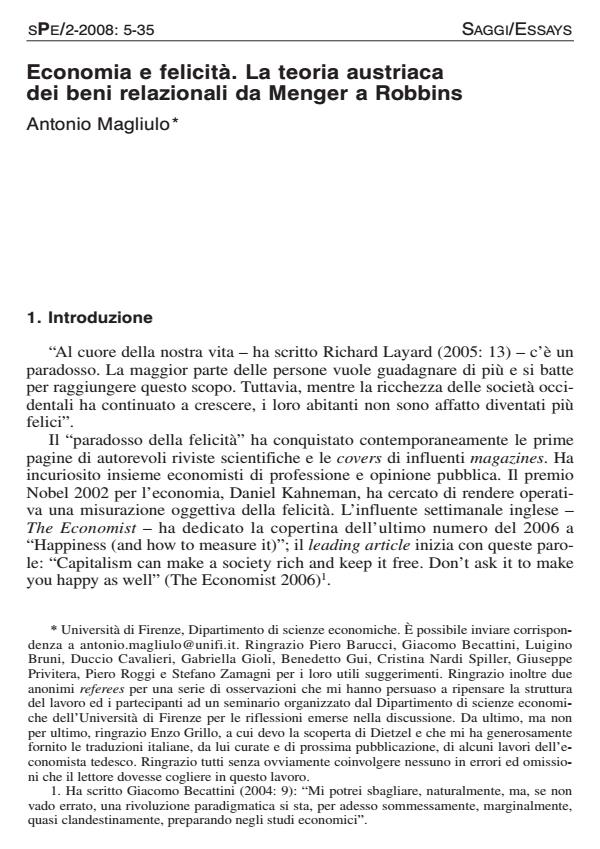Economia e felicità. La teoria austriaca dei beni relazionali da Menger a Robbins
Titolo Rivista STORIA DEL PENSIERO ECONOMICO
Autori/Curatori Antonio Magliulo
Anno di pubblicazione 2009 Fascicolo 2008/2
Lingua Italiano Numero pagine 31 P. 5-35 Dimensione file 654 KB
DOI 10.3280/SPE2008-002001
Il DOI è il codice a barre della proprietà intellettuale: per saperne di più
clicca qui
Qui sotto puoi vedere in anteprima la prima pagina di questo articolo.
Se questo articolo ti interessa, lo puoi acquistare (e scaricare in formato pdf) seguendo le facili indicazioni per acquistare il download credit. Acquista Download Credits per scaricare questo Articolo in formato PDF

FrancoAngeli è membro della Publishers International Linking Association, Inc (PILA), associazione indipendente e non profit per facilitare (attraverso i servizi tecnologici implementati da CrossRef.org) l’accesso degli studiosi ai contenuti digitali nelle pubblicazioni professionali e scientifiche.
Economics and happiness. The austrian theory of relational goods from menger to robbins - The paradox of happiness in economics has aroused a growing interest among scholars all over the world. In affluent societies, despite an increase in their income, many people do not declare themselves happier. One explanation is that economic growth can destroy some relational goods affecting happiness: family life, friendship, love, civil participation. Such an explanation is based on a historical interpretation: marginalism, denying the economic nature of relational goods, would have overshadowed the issue of happiness in economics. In this paper I intend to reconstruct the story of an attempt neglected but remarkable first made by Menger and Böhm-Bawerk and later by Wicksteed and Robbins: an attempt to solve the problem of human relationships in economics. JEL classification: B13; D60 Keywords: Austrian school; economics and happiness.
- Menger and the continental epistemology of uncertainty Stefano Solari, in The European Journal of the History of Economic Thought /2022 pp.920
DOI: 10.1080/09672567.2022.2113418
Antonio Magliulo, Economia e felicità. La teoria austriaca dei beni relazionali da Menger a Robbins in "STORIA DEL PENSIERO ECONOMICO" 2/2008, pp 5-35, DOI: 10.3280/SPE2008-002001